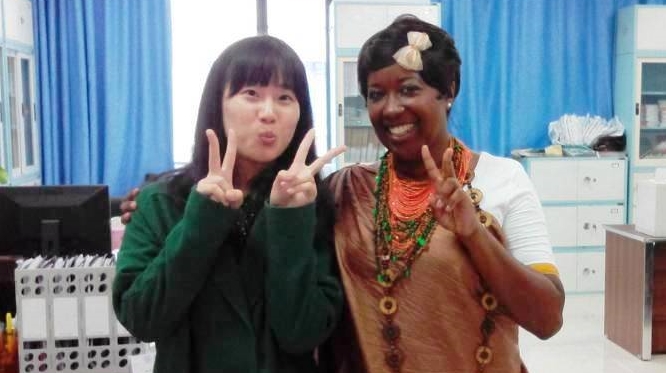
China and Uganda: tourism opportunities and conservation threats
Welcome to Diary of a Muzungu! This week’s guest post is by Sandra Rwese, a brilliant Ugandan entrepreneur who I first heard speak at a Nature Uganda public talk in Kampala. Sandra gave us an introduction to Chinese culture, the opportunities – and threats – that this new market poses to tourism and conservation in Uganda. Her insights are fascinating!

Sandra Rwese is a bilingual tourism expert with many years research experience in China’s outbound tourism landscape. In 2012 she won the Silver Prize for Product Innovation during the prestigious CTW Awards in Beijing. She writes:
“Travel is my religion, and Asia is one of the most fascinating places l happened to explore during my many travels. Having spent time living and studying in mainland China and Hong Kong, l decided to relocate back to Kampala in 2014. I saw a niche in Sino-Africa travel connections and immediately went about launching my tourism consulting firm Gulu & Hirst (G&H).
It took infinite persistence trying to market my advisory services in Uganda – in a country where CEOs prefer to wait until the absolute last minute before reacting to fresh business ideas. I remember once waiting three hours in a reception hall for a brief chance to meet one leading tourism stakeholder. Such is the journey towards promoting China’s USD 422 billion consumer potential to Uganda’s tourism fraternity.
Part of my consulting includes pushing for ecological conservation and, with each public lecture or sales training session, l never miss an opportunity to caution my audiences on the environmental ramifications of mass travel from China. Yes the Chinese have big money to spend overseas, lots of it. But their high propensity for eating arthropods and game meat could come at a higher cost to Uganda’s plant and animal species than we imagined. We simply cannot afford mass Chinese arrivals in groups as large as 200 per flight.


Chinese tourists are fearless and have gained ill-repute in almost every country so far. Nothing is off limits. Not even rampant trafficking of cheetah hides, donkey meat, lion bones, ivory, sandalwood, albino crocodiles, butterflies, pangolins, sea turtles, and rare national treasures. In my analysis, Uganda’s only hope in upholding species protection rights is by forming legally binding partnerships with travel agents and institutions sending visitors from China. So that their groups are fewer and contained.
New Zealand is doing just that i.e. partnering with travel agents, universities, and FITs (Free Independent Travelers) in China to bring controlled tour groups. This closes the loop on traffickers who often sneak in on individual tourist visas. I see a win-win situation for Uganda if only this matter is taken as a matter of urgency; especially with new waves of Chinese migrants setting up tour companies right here and ferrying in travellers whose origins are anyone’s guess.

The second strategy would be to use Chinese social media campaigns to promote responsible tourism. Community outreach is critical and netizens must be alerted to Uganda’ laws against poaching and wildlife plunder. G&H is moving in this very direction towards RenRen, Sina Weibo, WeChat, Qzone and other popular social apps to convey Uganda’s conservation mantra to the 136 million Chinese planning annual trips abroad. We can successfully build #BrandUganda on such social platforms within China by spreading the message that “Uganda is not for sale.”
Thank you Sandra for some illuminating words and practical advice about the Chinese in Uganda and Africa.
Listen to Sandra being interviewed by Eric Olander on The China Africa Project debating the question: Chinese tourist arrivals in Africa are up, so why aren’t African travel companies more excited? Click on the green button below.


























Thanks for the great article and informing us about how tourism can be promoted in this lovely country. in fact i have an idea of starting a social media campaign for promoting tourism in uganda code named
# UGANDA THE LAND OF WONDER very soon the Facebook page and Twitter pages will go up.
i currently write a blog where i will start writing articles about tourist opportunities in my lovely country UGANDA.
Thanks
Dear madam,
Iam a Ugandan and i agree with you with your experience am sure this will happen,I have stayed in West Africa and I saw the similarities,there are no species untouched there besides the protected areas .It will be great that some law is there to protect our wild life through out the country not only reserved areas.only domestic serves
Hello Chandrakant,
I hear you: “in West Africa I saw the similarities,there are no species untouched there besides the protected areas.”
It’s very sad indeed. They actually say that the majority of wildlife in Africa lives outside the protected areas so it means there is so much diversity without protection. I guess there is little chance of survival, because of the pace of human ‘development.’
Uganda in the process of reviewing and updating the Wildlife Act and there will be much stricter penalties for poaching and trafficking of wildlife products. Until now, penalties have been quite pathetic and therefore people have been able to get away with all kinds of wildlife crime.
Thanks for your comment.
Dear Muzungu,
This is really alarming, i hope the Govt protects our wildlife.
Thanks for this article.
Yes, it is very alarming. Feel free to share this article so we spread the word…
The situation is turning bad to worse! Look @ this latest publication by my friend Lily Kuo titled: “The Donkeys Kenyan Families Need to Survive are Heading to China for Medicine Promising Longer Life.”
https://qz.com/925291/donkeys-in-kenya-are-slaughtered-to-meet-demand-for-ejiao-in-china/
YUCK! Nothing is sacred… it seems everything is there to be consumed! And in vast quantities
I disagree with the tone of the article…i feel if this can be written about the ‘average’ Chinese tourist to Uganda then we must be fair and look at all the foreign ‘tourist’ groups–starting with the US / UK ‘Muzungu’ groups. Worse is said about them than is probably published and i may be a little choosing of the Chinese than them. The ‘Muzungu’ tourist groups come in as that ‘tourists’ and yet they are coming to find jobs…use their tourist documents to dodge work permit registration…some end up ‘over-staying’ and then turning into illegal residents at the expense of locals…chances are you will not find this tourist ‘boosting the economy’ but instead somewhere in Owino market trying to buy-off the cheap stuff…it has been mentioned how of late we are having quite ‘too’ many of ‘white’ people flocking in…and it is common to hear that some of these ‘Muzungu’ tourists-later-residents might actually be outlaws in their home countries….oh and recently one made a silly remark as she prepared to return to her ‘Muzungu’ country ”I hate Uganda’ oh plus i bet someone told her when we get tourists we are supposed to cook for them, do their laundry as part of ‘hospitality’…Culturewise?–i would still choose Asia over Muzungu…its usually the Muzungu who will think that everyone is excited to hear them speak luganda or that they can address anyone in any part of Uganda in ‘luganda’ without thinking that sometimes its best to keep what they have learned to themselves as some parts and cultures find ‘luganda’ offensive. It is common to find the Muzungu tourist smoking all over the place and forgetting that we need this country to have clean air instead of trying to make people sick. I look forward to your article on the threats of having white/ Muzungu tourists in Uganda or Africa (beyond ‘natural’ to the environmental, social, moral, cultural, economic, and security aspects ) Thank you.
Gosh, reading all that made me feel quite breathless!
Are we actually missing the point of the article? Ugandan wildlife needs to be protected from people who can potentially destroy rather than build it. The Chinese have been known to have a lucrative trade in animals all over the world and this article is trying to educate us all about the dangers. We deviate from the point if we bring up other issues that should be best addressed on a more relevant forum.
Thank you very much mzungublog for the eye opening article.
The subject of China in Uganda, and Africa, is huge and this article touches on a few aspects only.
The threat to wildlife from increased arrivals from China (not just tourists, but businessmen too with their networks and investment) is very real.
Some people in tourism industry want to blindly encourage Chinese tourists because of the size of their market – not understanding how different they are in so many ways to the ‘traditional’ Western tourist.
Thanks for the appreciation – more articles on China and Uganda coming soon…
Thank me…why not?
http://www.GULUANDHIRST.com
Good and educative podcast.Thanks sandra for your insights.
You can read Sandra’s latest article here: Uganda can Benefit from Growing Chinese Tourists Market into East Africa.
Thx for sharing.Great
I planned to go China, but suspended by the coronavirus, so can only learn Chinese at home and took the live online lesson by communicating with native-Chinese teachers from eChineseLearning
It seems good currently. Do you think this method of learning is realistic?
Of course 🙂
Good luck!